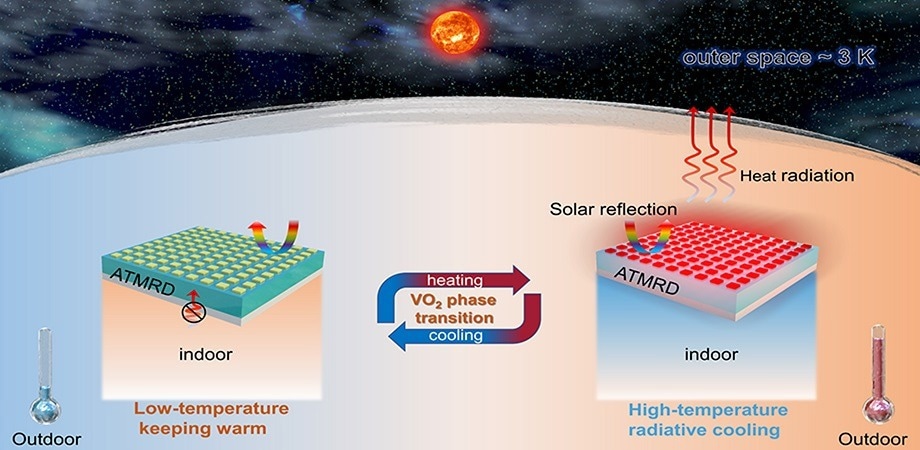Reviewed by Danielle Ellis, B.Sc.Sep 5 2024
According to Advanced Photonics, researchers from the Beijing Institute of Technology created a novel type of temperature-adaptive radiative cooling system that dynamically adapts its cooling capabilities in response to the ambient temperature.
 The metasurface-based radiative cooling device adapts to ambient temperature changes. Image Credit: Junlin Yang (Beijing Institute of Technology)
The metasurface-based radiative cooling device adapts to ambient temperature changes. Image Credit: Junlin Yang (Beijing Institute of Technology)
Discovering sustainable solutions for energy management is becoming increasingly important as the world’s energy crisis worsens and climate change quickens. Passive radiative cooling is a promising method that uses no additional energy and lets items cool by radiating heat straight into space.
Materials used for radiative cooling should perform well in terms of solar reflectance and emissivity. Although many different materials for radiative cooling have been developed, the majority of them exhibit static emissivity. This indicates that even at low ambient temperatures, the radiative cooling materials have a significant cooling capability.
This might lead to “overcooling,” which raises the heating system's energy consumption. Conversely, thermochromic phase-change materials are excellent choices for cooling through dynamic radiative processes. There is no need for a power supply, circuits, or moving parts!
This development expands on earlier research using vanadium dioxide (VO2), a substance with a reputation for being able to transition between several thermal radiation states. The device's performance is enhanced by the new design’s metasurface, which has a periodic array of VO2 squares to balance low solar absorptance and strong thermal emissivity.
The Temperature-Adaptive Metasurface Radiative Cooling Device (ATMRD) is a novel device that exhibits significant advancements over earlier models. Its solar absorptance is merely 27.71 percent, 7.54 percent less than previous models, while its high-temperature emissivity of 0.85 is 13.3 percent greater. Furthermore, compared to earlier devices, its modulation of emissivity is 20% better, which increases its efficiency in temperature regulation.
By integrating a temperature-adaptive metasurface with vanadium dioxide, we've significantly improved the efficiency of radiative cooling technologies. Our new device not only reduces solar absorptance but also enhances thermal emissivity, addressing the critical issue of overcooling. This advancement holds great promise for optimizing energy use and advancing sustainable thermal management solutions.
Prof. Jingbo Li, Researcher, Beijing Institute of Technology
The study illuminates how the superstructure's geometric characteristics affect the device's performance and explains how superstructure-excited multiple resonances might improve thermal radiation efficiency.
The published study has the potential to significantly impact the sectors of thermal management and renewable energy since it provides useful theoretical and practical references for designing and constructing VO2 superstructure functional devices.
Emphasizing how cutting-edge materials and design methods may improve radiative cooling technologies, the knowledge obtained could lead to better thermal management strategies that save energy and pave the way for a more sustainable future.
Journal Reference:
Yang, J., et. al. (2024) Temperature-adaptive metasurface radiative cooling device with excellent emittance and low solar absorptance for dynamic thermal regulation. Advanced Photonics. doi.org/10.1117/1.AP.6.4.046006